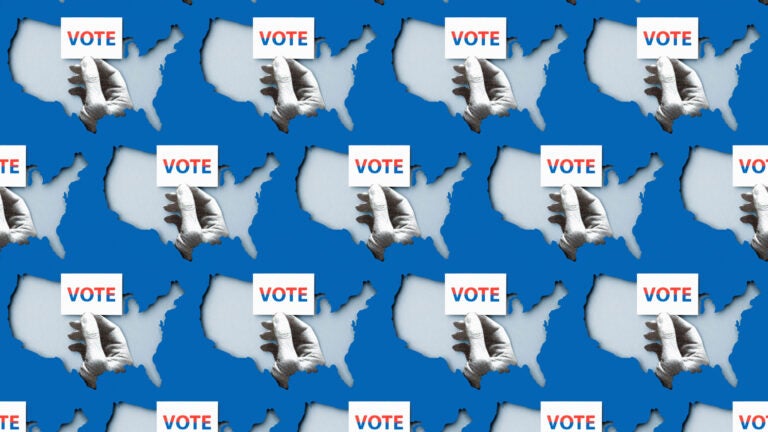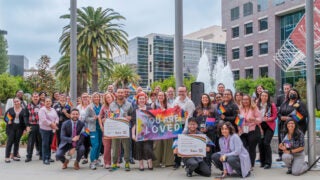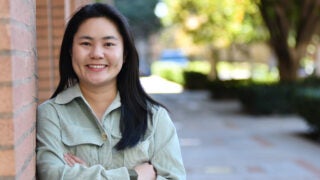
More than two-thirds of U.S. adults said the presidential contest on Nov. 3 is causing major stress in their lives. (Photo/CACTUS Creative Studio, Stocksy United)
Stressed out by the 2020 election? You’re not the only one
Cope with stress and anxiety in the run-up to the divisive presidential election and other races with tips from these USC experts.
If you feel especially stressed and anxious about the contentious 2020 election, it’s not just you.
More than two-thirds of U.S. adults said the presidential contest on Nov. 3 is causing major stress in their lives, according to a recent survey. USC health experts have seen increased demand for support and counseling services since the start of the COVID-19 pandemic. They expect the upcoming election will add even more anxiety.
“We’re already a bit overworked and tired now,” said Lara Hilton, director of the USC Center for Work and Family Life. “This is that extra layer on top.”
Thankfully, support is available to USC students, faculty members and staff members to help them cope with the uncertainty and stress of the 2020 political season.
Trojans have access to many resources to cope with 2020 election stress
At USC Student Health, counselors provide one-on-one sessions, group workshops and other resources to undergraduate and graduate students. Kelly Greco, assistant director of outreach and prevention services, encouraged students to reach out now if they are feeling worried or anxious.
“What we’re hearing that is very different about this election is that we may not know the results on November 3,” she said. “We’re going to have to sit and tolerate the uncertainty, and that is creating stress for many people.”
To help students cope, USC Student Health’s Counseling and Mental Health Services team is holding election stress workshops twice a week online through mid-November. The sessions take place on Mondays at noon and Thursdays at 5 p.m. Students can sign up through the My Student Health Record portal.
Students can also talk about election-related stress and other mental health concerns with counselors through Let’s Talk drop-in sessions. The online meetups are open to all students, regardless of location. Students in California can also request individual therapy sessions for support and resources by scheduling an appointment online or calling 213-740-9355.
“This is a really stressful time on so many levels,” Greco said. “We are working really hard to decrease stigma and normalize the fact that this is a high-stress time and that reaching out for additional support can really help.”
Therapists from USC Student Health are also embedded in USC’s student equity and inclusion programs, such as the Center for Black Cultural and Student Affairs and the LGBTQ+ Student Center. These counselors often share students’ own cultural background or understand issues important to them.
“To feel a sense of connection and safety, it is important to have these discussions within certain communities that are impacted by policies that are on the table in this election,” Greco said. “For example, we have many international students who have been affected by different policies and changes.”
Similar programs and resources are available to USC faculty and staff members through the USC Center for Work and Family Life. Its monthly Thriving Thursday session on Nov. 5 at noon will feature strategies to overcome election fatigue. Free and confidential services include support groups, one-on-one counseling sessions, coaching and department-level consultations. And a special well-being workshop hosted by the USC Dornsife College of Letters, Arts and Sciences on Oct. 29 at 2 p.m. will discuss how to have difficult political conversations.
Election stress can be intense, but here are some ways to cope
Hilton expects many people will deal with some level of what she termed “election stress disorder,” a phrase coined after the 2016 presidential election. It includes symptoms like tension, trouble sleeping or concentrating, irritability, agitation when watching the news or interacting on social media, and difficulty with personal relationships.
Stress can affect people physically, emotionally and socially, Hilton said. But there’s good news: Mental health experts have found evidence that certain strategies can relieve that stress.
The first strategy: Focus on what you can control, Hilton said. Get a good night’s sleep, eat well and stay active. Limit your exposure to social media and TV news, take a mental break by watching funny video clips online or close your laptop and go for a hike.
“It’s really about getting back to the basics,” she said. “You will feel better if you get out, walk the dog, go for a walk, get into the sunlight.”
Greco echoed those suggestions, encouraging students to make a daily plan with a few goals they want to accomplish.
“All this uncertainty around the election and COVID creates loss of control and anxiety,” she said. “So, make sure you find structure every day and focus on what you can control.”
A second approach to managing stress is to engage in meaningful activities. For many people, connecting with supportive friends or family members can help them get through stressful times, Hilton said. And one meaningful activity related to relieving anxiety about the election is to vote early.
“Don’t avoid the task,” she said. “Procrastination promotes anxiety.”
Third, recognize that the election results might still be murky on Nov. 3, Hilton said. Accepting that might help some people better deal with stress as election day approaches.
“But if you think that is going to raise your anxiety, stay busy with the other two strategies,” she said. “Be empowered by focusing on what you can control — including voting — and let go of the rest. And if you need further advice, if you are having sleepless nights or heightened anxiety or stress, please call or email us.”



